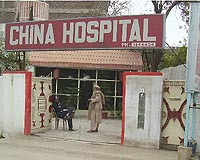 |
Beijing (AFP) Aug 14, 2009 The world is facing bigger inequalities in health and access to medical care than 30 years ago, the World Health Organization said in two global reports launched in China Friday. A child born in a suburb of Glasgow, Scotland, can expect to live 28 years less than another living just 13 kilometres (eight miles) away, while a girl in Lesotho is likely to live 42 years less than one in Japan, the WHO said at the launch of the reports in Beijing. This year's World Health Report focused on the way primary health care is organised, financed and delivered in rich and poor countries around the world. A second report, "Closing the Gap in a Generation," documents the results of a three-year investigation into health inequalities between and within countries, the WHO said in a statement. "Inequalities in health outcomes and access to care are much greater today than they were in 1978," WHO representative in China Hans Troedsson said. "Genes do not explain any of this," the doctor added. "Instead, the differences between -- and within -- countries result from the social environment where people are born, live, grow, work and age. It also depends on health systems that are put in place to manage illnesses." Giving an example, the WHO pointed out that in Sweden, the risk of a woman dying during pregnancy and childbirth is one in 17,400 while for mothers in Afghanistan, the odds are one in eight. The WHO reports call for better understanding of the root causes of health inequalities and for action to improve daily living conditions. They also urged policy makers to return to basics and focus on prevention. "Instead of relying on specialist care or biomedical interventions, we should focus more on prevention and strengthen primary level care," Troedsson said. "Better use of existing preventive and primary care measures could reduce the global burden of disease significantly." China recently announced an ambitious reform plan, drawn up with WHO help, that aims to provide basic medical care for all by 2020. An initial three-year programme will see 850 billion yuan (124 billion dollars) invested from 2009 to 2011 to reform the unpopular current system which is seen as costly, badly funded and providing shoddy treatment. "Everyone -- male or female, young or old, rich or poor -- should have access to health care that is fair, people-centred, affordable and efficient. "But health systems will not naturally gravitate towards fairness and efficiency. Deliberate policy actions are needed," Troedsson said. Share This Article With Planet Earth
Related Links Hospital and Medical News at InternDaily.com
 China probes hospitals over illegal transplants: report
China probes hospitals over illegal transplants: reportBeijing (AFP) Aug 13, 2009 China is investigating its organ transplant hospitals following reports that some are carrying out illegal operations for foreigners willing to pay much higher prices, state press said Thursday. A team from the health ministry and the National Organ Transplantation Committee was in the process of inspecting the 164 medical institutions qualified to carry out organ transplants, the China ... read more |
|
| The content herein, unless otherwise known to be public domain, are Copyright 1995-2009 - SpaceDaily. AFP and UPI Wire Stories are copyright Agence France-Presse and United Press International. ESA Portal Reports are copyright European Space Agency. All NASA sourced material is public domain. Additional copyrights may apply in whole or part to other bona fide parties. Advertising does not imply endorsement,agreement or approval of any opinions, statements or information provided by SpaceDaily on any Web page published or hosted by SpaceDaily. Privacy Statement |